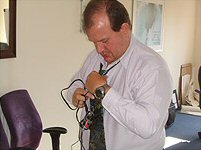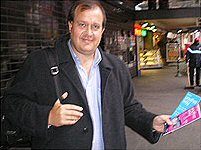
Mystery Shopper Takes It To Extreme
|
By Julian Knight
Consumer affairs reporter, BBC News
What do you take to work with you? An umbrella? A briefcase? A lunchbox perhaps? Colin Shaw's workplace weapons of choice are a little more cloak and dagger.
Colin does not leave home without his tie pin camera and hidden microphone.
He is not a spook but a new breed of mystery shopper.
The self-styled extreme mystery shopper goes to great lengths to give chief executives and boards of directors an insight into what is happening on their shop or call centre floor.
"I will regularly film the experience I have as a customer from start to finish to show senior executives," he tells BBC News. Some of Colin's mystery shopping forays takes weeks of planning.
"Insurers often ask me to test their claims handling. Recently I hired a basement flat entirely for the purposes of flooding it to test service standards. My client wanted to see how the people working the claims handling department and the call centers dealt with the contractors and the claim. I also bought a cheap car, insured it then deliberately crashed it against a tree stump.”
"Insurers tend to come from the viewpoint that people are trying to defraud them, there is little trust shown in the customer. What's more, little thought is given to the customer experience. For example, when I crashed the car the tow truck refused to take me and my car, this meant I was left in the middle of nowhere."
Executive shock
For most senior executives the results of the mystery shopping exercises are a bit of shock. "It is often far worse than they imagine. As an outsider I have carte-blanche to tell them that their baby is ugly," Colin says. He reckons nine out of 10 senior executives are not in touch with their customers. "Most have been away from the sharp end for too long. Others are purely focused on the bottom line, seeing customers as transactions to be processed. Customers do not want to be processed."
Colin has been operating his extreme mystery shopper business, called Beyond Philosophy, for five years. There are now some 20 shoppers on his books - dealing with several major UK insurers, Comet, Yorkshire Water, Toyota and Dell computers. Prior to setting-up in business, Colin was a director at BT.
Competitive edge
Mystery shopping has a long history in the UK.
The first mystery shoppers were employed 60 years ago to check financial advisers were doing an honest job. The Financial Services Authority still uses shoppers in this role from time to time. Over the past decade mystery shoppers have been increasingly used by retailers, utilities and even the public sector.
"Mystery shopping offers a great deal to businesses. Crucially it gives managers a means to test their staff training... it also allows them check on the general ambience, store layout, stock handling and health and safety issues," says Dale Atkinson, spokesman for the British Retail Consortium.
"It (mystery shopping) should be an ongoing thing, firms checking that the service they offer is most competitive. Anything to give you an advantage on the High Street," Mr Atkinson added.
But Colin makes a clear distinction between his brand of extreme mystery shopper and the traditional mystery type. "They go in with a check list of questions, usually dictated from upon high. Their objective is to test staff to see that they are following company policy. However, how does this take account of customer experience, often the dictates from upon high are about making as much money as possible from the customer and not about furthering a relationship," he said.
Inside out
I strolled into a branch of a leading High Street bank located in London's Piccadilly with Colin and instantly his mystery shopper antenna was twitching. The branch décor can be tactfully described as unusual. You take an escalator up to the branch from a patterned mirrored foyer - think mirror ball effect. There are some posters advertising products, haphazardly attached to the side of the escalator. All in all, it is pretty shabby.
"There is nothing to welcome you to the bank to let you know where you are," is Colin's first reaction.
"Why do banks have to be boring? Where is the thought of providing an experience for the customer?"
|
Colin asked a member of staff about their 0% credit card deals. After a couple of fact-finding questions the staff member started to try and sell him a loan.
"I did not ask about loans, it would be far more expensive for me to take out a loan," he replies.
"They are obviously being targeted on loan sales," he said later after we had left. "This is an example of inside-out thinking. This is when firms take what is good for them and try and impose it on the customer.
"The key is to take an outside in approach - look at what the customer wants and try to meet that need. If a fast turnover sale is required, then fine. If it is an empathetic approach then go for that."
In particular, Colin points to firms sending their call centers abroad as an example of inside-out thinking.
"As we all know, it was about cost rather than the customer experience. Some call centers are fine but many have been found to be wanting. As a result, several firms in the US and the UK are now moving either all or some of their services back from abroad," he said.
Perhaps it’s another case for the extreme mystery shopper?
To find out more about the type of Mystery Customer Programs we can custom design for your company,
CLICK HERE.

